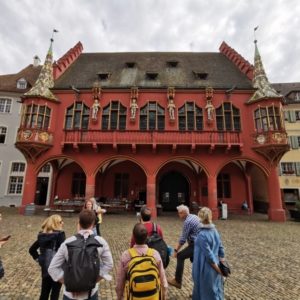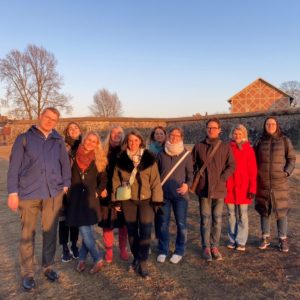Material
Micro-Teaching
Information
Full title of the example
“Micro-teaching: trying out teaching on campus ”
Topic
Coherence between PK, PCK and school practice
Type of the example
Power Point Presentation
Target group
Student teachers
Institutions involved
Student teachers, university teachers and/or experienced teachers
Objectives
- Provide student teachers, school teachers and university teachers with insight into micro-teaching as an on-campus activity
- Underline observation and peer-feedback as important tools for teachers
- Prepare the grounds for further development of micro-teaching
Short description in English
Micro-teaching is an on-campus activity at the University of Oslo designed to prepare teacher students for their first school practice period. Students try out teaching in small groups.
The activity is instructed by a university teacher or an experienced school teacher. Students take turns: Each students plays the role of a subject teacher for 5-7 minutes while the other students in the group participate as students. The teaching sessions are video-taped and used as the starting point for a group discussion.
Longer description in the target language
Mikroundervisning er en campusaktivitet som finner sted tidlig i studiet, før studentenes første praksisperiode. Formålet med mikroundervisning er å forberede studentene på praksis. Studentene jobber i små grupper under ledelse av en fagdidaktiker eller en erfaren faglærer. Studentene forbereder en time i ett av sine fag, og de spiller ut starten av timen foran sine medstudenter (som for anledninger fungerer som elever). Hver «time» tas opp, og opptakene danner så utgangspunkt for en strukturert tilbakemeldings-runde: Studentene ser på hvert opptak, og de observerer og noterer. Når de har sett på et opptak, gir de hverandre feedback med utgangspunkt i to spørsmål: Hva fungerer bra, og hvorfor – og hva kan endres, og hvordan? Studentene får anledning til å kommentere sin egen «time» før medstudentene og kommer til ordet. Mikroundervisning kombinerer med andre ord to viktige lærerkompetanser: evnen til å observere seg selv og andre – og evnen til å vurdere seg selv og andre som en viktig forutsetning for faglig utvikling.
Download Information and Example
Events: ConnEcTEd
Blog: ConnEcTEd
Es gibt derzeit noch keine Beiträge in dieser Kategorie.

Reisebericht: ConnEcTEd Project Meeting in Zagreb
Ein zentrales Anliegen der School of Education FACE ist die Entwicklung kohärenter – also strukturell und inhaltlich sinnhaft zusammenhängender – Curricula oder Module im Rahmen des Lehramtsstudiums. Was liegt da in Zeiten der Globalisierung näher, als sich anzusehen, wie dieses Prinzip in anderen Staaten und Bildungssystemen umgesetzt wird? Im Rahmen des Projekts ConnEcTEd geschieht genau das. Im September dieses Jahres reiste eine Freiburger Delegation nach Zagreb, um sich dort gemeinsam mit Projektpartner*innen aus Oslo, Nizza, Helsinki und Zagreb in Präsenz zu diesem wichtigen Thema auszutauschen.

Ins Bächle „dappen“, oder nicht? Treffen des ConnEcTEd-Teams in Freiburg
After the first in-person-meeting in March in Oslo, the ConnEcTED-Team met for the second time in Freiburg im Breisgau at the end of May. In the „Green City“ on the western edge of the Black Forest, right on the border to Switzerland and France, the project members reported on their work, discussed new tasks and further steps in the project, as well as forms of collaboration in different IOs.

Reisebericht: Das ConnEcTEd-Team in Oslo
Ein zentrales Anliegen der School of Education FACE ist die Entwicklung kohärenter – also strukturell und inhaltlich sinnhaft zusammenhängender – Curricula oder Module im Rahmen des Lehramtsstudiums. Was liegt da in Zeiten der Globalisierung näher, als sich anzusehen, wie dieses Prinzip in anderen Staaten und Bildungssystemen umgesetzt wird? Im Rahmen des Projekts ConnEcTEd geschieht genau das. Ende März dieses Jahres reiste eine Freiburger Delegation nach Oslo, um sich dort in Präsenz zu diesem wichtigen Thema auszutauschen.
Funding
This project receives funding from the Erasmus+ programme of the European Union (Strategic Partnerships, KA 203).
The contents of this website and the view expressed in the news and publications are the sole responsibility of the authors and under no circumstances can be regarded as reflecting the position of the European Union.




